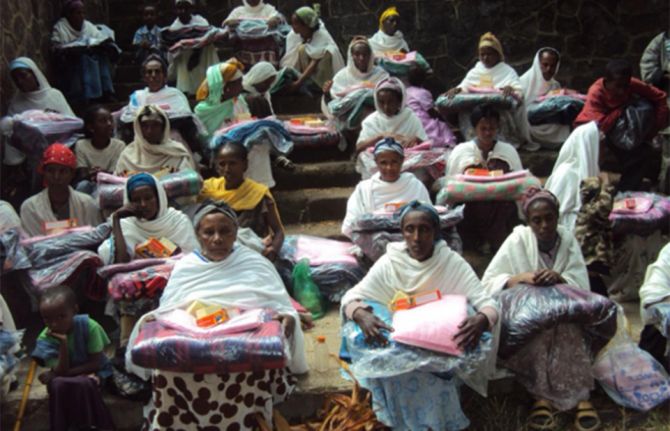
Feature Story
Translating intent into action in Ethiopia
25 November 2008
25 November 2008 25 November 2008
The Ethiopian Business Coalition against HIV/AIDS (EBCA), GTZ Engineering Capacity Building Program, the World Bank Institute and the Rapid Results Institute implemented a pilot programme to achieve rapid HIV results within businesses in Ethiopia in 100 days.
Implementing ambitious long-term HIV programmes in the workplace can be a daunting undertaking for a business. In Ethiopia, partners have piloted a management tool designed to restructure policies into a series of short-term goals and produce concrete results quickly.
The Ethiopian Business Coalition against HIV/AIDS (EBCA), GTZ Engineering Capacity Building Program, the World Bank Institute and the Rapid Results Institute implemented a pilot programme to achieve rapid HIV results within businesses in Ethiopia in 100 days.
In March and April 2008, 180 staff from twelve companies, together with six members of EBCA, attended workshops in “Rapid Results Approach” (RRA) for their business HIV programmes. The trainings gave the company teams—management and employees—an opportunity to identify HIV focus areas, set ambitious targets and develop work plans.
Tadesse Tekallign of Crown Cork and Can Share Company is in no doubt about the value of the initiative. “The pilot project is creating new best practices on HIV in Ethiopia’s private sector.” “The companies are finding their own solutions and tackling challenges quickly to produce very effective results,” Tekallign continued.
Achieving their goals

In March and April 2008, 180 staff from twelve companies, together with six members of EBCA, attended workshops in “Rapid Results Approach” (RRA) for their business HIV programmes.
In the three months following the training EBCA gave outreach support to the companies by regular telephone calls, weekly meetings and assistance with setting up partnerships with non governmental organizations and associations who could provide services to the companies.
The companies’ team commitment was impressive and progress substantial. All companies reached, and exceeded, their goals within the time period.
|
Ten companies in Ethiopia took part in the 2008 pilot programme and their goals for the following 100 days were: Alkyd Resin Share Company Crown Cork and Can Share Company East Africa Holding Company Emergency Relief Transport Kaliti Construction Kaliti Metal Mugher Cement Prefabricated Building Parts Production Enterprise Total Ethiopia |
Sustainability
Following the completion of the pilot, a workshop on experience-sharing and sustainability was held for all companies who had participated. EBCA is continuing its follow up and technical support to ensure companies continue their HIV programme implementation.
Next round
EBCA, together with the African Capacity Building Foundation, the World Bank Institute and the Rapid Results Institute have recently launched the second round of Rapid Results in 10 additional Ethiopian companies:
- Coffee Processing
- Comet Transport
- Ethiopian Electric Power Corporation
- Faffa Food Share Company
- Kokeb Flour and Pastas
- National Alcohol and Liquor
- National Mining
- National Motor Corporation
- Nyala Insurance
Rapid Results Approach (RRA)
The Rapid Results Approach (RRA) is a management tool designed to give quick and meaningful results within 100 days or less. By focussing on results it aims to jumpstart major change efforts and assist implementation. RRA is based on the belief that the best way to build capacity is to provide people with real-time support while they work to achieve an ambitious short-term goal that is of critical importance to the organization.
In addition to achieving short-term results and teaching people how to work together, the approach aims to create grassroots capacity to carry out large-scale, complicated changes. It can help companies take their most challenging long-term HIV/AIDS projects and restructure them into a series of short-term initiatives that produce real results quickly. The approach also offers business leaders a new set of skills and expertise in coaching, team building and achieving measurable results quickly.
“UNAIDS is very happy to support the Rapid Results Initiative in Ethiopia. This approach of formulating an action plan with a sharpened focus on producing early results, can be a great model for the private sector and can help engage them better in the AIDS response," said Regina Castillo, Chief Private Sector Partnerships, UNAIDS.
The approach has also been used successfully in HIV and reproductive health programmes in Kenya, Sierra Leone and Madagascar.
Translating intent into action in Ethiopia
Feature stories:
Business coalitions from Latin America and the Caribbean gather in Brazil (13 October 2008)
UN Secretary-General convenes pharmaceutical companies in New York (09 October 2008)
The Life Initiative – Hotels addressing AIDS (23 July 2008)



